What follows is a spoiler laden discussion of the book The Dispossessed by Ursula K. Le Guin. Beware if you’re worried about such things.
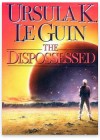 Physicist Shevek leaves his homeworld to join physicist colleagues on the planet his people abandoned generations ago. The Urrastian’s aggressively capitalistic and gender-segregated society is quite a change from the anarchism/non-authoritarian communism practiced on Annares, his home. At home, no one owns anything, people live in dorms, and share in either prosperity or lack. Though some are starting to wonder if they really are as free as they believe. Shevek is determined to share his breakthroughs with the known universe, and he’s not sure either Annares or Urras will permit him to do it.
Physicist Shevek leaves his homeworld to join physicist colleagues on the planet his people abandoned generations ago. The Urrastian’s aggressively capitalistic and gender-segregated society is quite a change from the anarchism/non-authoritarian communism practiced on Annares, his home. At home, no one owns anything, people live in dorms, and share in either prosperity or lack. Though some are starting to wonder if they really are as free as they believe. Shevek is determined to share his breakthroughs with the known universe, and he’s not sure either Annares or Urras will permit him to do it.
K: This time our Nebula winner is The Dispossessed by Ursula LeGuin, who by 1974 had won the Nebula for best novel twice — and was the only woman to have yet won it at all.
J: Don’t worry. The book is still about a guy. It’s not full of girl cooties.
K: At least there are women. Well, sort of. But we’ll get to that in a bit. The Dispossessed takes place in the same universe as Left Hand of Darkness, though it tells a story from an earlier time period and from a different planet.
J: Sort of the same theme though. We learn about two different societies. One of them from an outsider’s point of view, though the other from an insider’s point of view.
K: Right. Quite a lot of these early Nebula winners have been more what I would deem ‘thought experiments’ than books with a real plot. The author has an idea and works up some characters in order to better describe their idea. Sometimes the characters suck (Ringworld) sometimes they’re bland (Rendezvous with Rama) and sometimes they’re okay. I found that The Dispossessed‘s characters fell into the realm of okay.
J: This is at least my third time reading the book. It was popular in my college classes for some reason. I wouldn’t say a lot of the details.. well, any of the details really stuck with me. Or the characters. I had a vague memory of the main character and that’s it. I like this book okay, but I wouldn’t put it in my top five favorite Le Guin books. Sometimes I found it interesting and sometimes I found it dull. Never a hard slog, but I wasn’t breathless waiting to read more of it.
K: I definitely preferred it to Left Hand which is the only other LeGuin I have to compare to. Maybe because the situation was just slightly more believable? It was still stretching the bounds of my suspension of disbelief, but it worked better for me than the whole develop a gender thing.
J: I’ve already forgotten his name.. was it Shevek? Did you feel his society, his world, and all was kind of.. blah? Sort of like, there was no tension, no drama. It didn’t feel real or human.
K: I didn’t feel like there was no tension exactly. I felt like they were all fooling themselves (something which they came to realize themselves, at least Shevek and his compatriots). But it was all too polite. It was like they were brainwashed. I just can’t imagine a society where uniformly there seems to be -no- one who flips out that their significant other is sent away from them on pretty flimsy context. But I guess that was kind of the point, to imagine a society where somehow that was true. But it doesn’t make it particularly realistic to me.
J: Maybe it just seemed like all their emotions were muted, yea. People got.. annoyed, or depressed. But not much else.
K: Yeah. They never seemed to get mad. How is that even possible? People get angry. All the time! It’s like Vulcans except they aren’t particularly logical.
J: And I wonder if they’re supposed to care about the children at all. That scene when Shevek was a toddler, he and the other kid both had full diapers. Like they’d been neglected, even though there was someone watching them. Was that supposed to show that society doesn’t care about individuals, just itself?
K: I’m not sure. Obviously part of the… indoctrination… is to remove the children from their parents to weaken the attachment there. And then to make everyone think it’s their own idea and for the best. I don’t think there was any intent to suggest they were physically neglected. It might have just been a detail.
J: I dunno. It just struck me that it was both of them and not just one. There was much to the society to recommend it. I’d love to work on whatever I wanted. Even if it meant doing some of the grunt work sometimes. Although I wonder if I would’ve turned into one of the hermits. Dunno if I could take living in a dorm all the time.
K: It certainly struck me as a society that on its surface seems like a haven for introverts, in reality would probably suck for them a lot. To not really be able to have a space to call your -own-… ugh. Nightmare.
J: And nobody complained about the food! The whole point of a cafeteria is to complain about the food! Actually I was a little surprised they had art in any form. Considering Rite of Passage, where they couldn’t make art anymore. The establishment had a stranglehold on what type of art, and you couldn’t do a lot of personal, individual type art, but art still existed and was still being made. By that I include plays, music, etc, of course.
K: It did sound like art for art’s sake was discouraged – not ‘functional’ exactly, even if it did feed an emotional need. Part of the problem was the subsistence nature of life on Anarres. Would they have been able to keep up the facade of their communist living if there was more time for leisure and less hardship? I’m thinking the cracks would have shown sooner — LeGuin did give the society a great deal of thought, really. She probably came closest to the circumstances in which anything like that could actually work.
J: She definitely does seem to fit the environment to the society. Like in Left Hand. Or rather fit the society to the environment. What I was rather surprised by was how much physics was in the book. I hadn’t remembered that at all.
K: Except there was no physics in the book, of course. I did like the idea that this other society came at physics from such a completely different mindset that they discovered and described the universe in a way totally unrecognizable to Terrans — and yet equally valid.
J: Well, to someone who never studied physics, it sounded like physics. Even if it was technically more a.. philosophy of physics? With a little Terran history of physics thrown in. I did find it interesting that this book is the creation of the ansible. I didn’t remember that.
K: I didn’t know LeGuin had coined the term, but we all know how lacking my background in classic sf is, so it’s hardly surprising. I did like that we saw the creation of such an important device — and that it really wasn’t telegraphed at the beginning that that’s what was going to happen.
J: Yea. I just assumed it already existed, if it was going to be mentioned at all.
K: It does help to place this book in the timeline of the other Hainish series. Since LeGuin hasn’t done anything as helpful (at least from my perspective) as include a timeline or stardates or anything to otherwise indicate the internal chronology. It does help justify the book — certainly in a way that Left Hand was not justified — as important to the series as a whole rather than just another standaloneish book in the same universe.
J: I think trying to turn it into a ‘series’ or construct a timeline would drive you crazy. Since it wasn’t designed that way and I don’t even know if there’s much or any character crossover. Which at least reassures me, because it means I don’t have to worry about reading them in any sort of order. I just checked and she doesn’t have any more Hainish books on the Nebula list, so my next point about not having to read everything when we get to that is kind of nonexistent. But in /theory/ it would’ve been nice not to have to read the whole series to read her next winning book. Too bad her next winning book is Earthsea like 4 or 5 and those are in order, afaik.
K: Well, if a series is good, then it shouldn’t be a problem to read it all, right? But as I think we’ve already discovered, the Nebula does not necessarily reward ‘good’ as in ‘readable’ (supposedly that’s the Hugo but I have my doubts about THAT too). It rewards some other quality. In some cases that seems to have been imagination/vision/forward-thinkingness, but not universally. Which may make for award-winning science fiction of the sort you can easily pick apart in an academic setting, but isn’t always fun to read. The two aren’t mutually exclusive, of course.
K: Anyway, my opinion is the Hainish books are a series, since they take place in the same universe. But no, the fact that I read this one after Left Hand didn’t really affect things, because what I learned from that book did not inform me of anything in particular (beyond the mere existence of this loose alliance) that allowed me to have a deeper/better understanding of this book.
J: My reading of the Hainish books is scattershot. I’ve read a couple others, I think. And a bunch of short stories/novellas. I like them best when they’re dealing with gender stuff and family structures other than traditional American nuclear family. Which this one only sort of does. And not in a unique way. I feel like kids raised in dorms is seen in other places. Brave New World maybe? And others.
K: Kids raised in dorms isn’t especially unique at all, no. Rite of Passage has kids that move in and out of dorms, and parents that don’t necessarily live together for long stretches of time. In fact, the gender and family issues in this book were just barely formed to the point where they weren’t much more than stereotypes and assertions. There was no insight provided. The closest we came was the very very brief scene toward the end of the book (chronologically the middle of the story) where Shevek encounters his mother and some of the other characters realize that a good part of her antagonism toward them is rooted in her guilt for essentially abandoning him and his father when he was a toddler. She’s uneasy with her decision and must therefore defend the customs that allowed/required her to make the choice, or else it makes her confront the consequences of her actions.
J: Wow. That’s deep. I didn’t get that at all. I think I just read it as her being annoyed he wouldn’t let her reconnect with him as an adult. I did notice, and it bugged me, that for all Shevek said men and women could and would do any job, though might have a better affinity for something over another, both midwives mentioned were women. And Shevek is a ‘hard’ scientist while his non-wife is a ‘soft’ scientist. While Le Guin managed to put women in some positions of authority, the equality didn’t seem to permeate everywhere.
K: Getting back to your first point, I think that’s exactly what happened back when she visited him in the infirmary while he was sick. It was after that that she kind of needed this elaborate justification in her head.
K: I also totally agree with you on the women in science issue. I felt like even LeGuin noticed what she was doing and as a result threw in randomly that old lady physicist/mentor for Shevek. G-something. But then she undermined even that by having her be kind of useless and almost Alzheimer-y.
J: Yea. I mean in general it’s miles ahead of most of the other books we’ve been reading. But it just didn’t seem like it went far enough.
K: It didn’t, but I guess I’m feeling like it may be a case of a book can’t be all things at once. Unlike with Left Hand, the construction of gender did not seem to be a main theme in this book, so its poor showing could just be a result of her focus being elsewhere. Except. Except for the fact that pretty much the lone female Urrasti was so clearly meant as a contrast to the women on Anarres.
J: I’d forgotten her. She has this one line where she says if the Anarres women would just come on over and have a spa day, they’d love it. And when she mentioned shaving, I didn’t think about it until afterwards that she meant everywhere, since they shave their heads.
K: Yeah. I wasn’t quite sure what we were supposed to take away from the shaving. Or from her. We weren’t really given any other female Urrasti to compare her to — except, I guess, for Odo, whose rise as a political activist seems all the more surprising given how little visibility women seemed to have in their society. Unfortunately for LeGuin, as soon as we found out the women were bald, I started mentally trying to compare the Urrasti with the Centauri and since it was actually not a bad fit overall, I now don’t have a very clear view of them as presented in the book.
J: *laugh* You’ve been watching too much Babylon 5. As for me, I still have not gotten over the name Odo. I can’t blame Le Guin for it, but it was difficult to remember it was a woman. Not that I didn’t have that trouble with some of the other names, but those were because it was intentionally ambiguous.
J: But as for Shevek and that woman, I still don’t know what that attempted rape was all about. Yes, he was drunk. Yes, there was a culture clash. Yes, she was exuding sex and flirting with him. But, she said no. Several times. Women never said no to him before?
K: That baffled me too. In a culture where individual autonomy is supposed to be the last and only word, what was his confusion? She. Said. No. You can’t get any more clear than that. Are we supposed to take away from this that women on Anarres never say no? Just because sex is free and open doesn’t mean everyone wants to have it all the time and with anyone who asks!
J: Yea, exactly. And I hate to tell you, Shevek, but just because you prefer women doesn’t make you a confirmed heterosexual when you’ll hook up with guys just to reconfirm a friendship, or whatever! And I do get sick of gay characters who only get to have sex with the self-identified straight guys, but that’s another topic altogether.
K: Another section that baffled me! Shevek… didn’t really want to have sex with him, but he let him have a pity lay? How is that good for anyone?! But it’s clear that LeGuin was still working out some views on sexuality. We know that she later realized her statement in Left Hand that rape was impossible in that society was completely ridiculous. I have no evidence, but it could be that these would be things to ‘fix’ if the book were written now.
J: Maybe.. maybe. I wonder if she ever returned to these particular worlds. I’ll have to look that up.
K: So the one thing we haven’t really talked about is the structure of the book. The way it’s published is in alternating chapters — Chapter 2 chronologically begins the story, while Chapter 1 sort of picks up at a point in the middle (after the events of chapter 12). Once I realized that, I admit I -was- tempted to read it in the timeline order, but I resisted. I wonder if she wrote it the way it’s read, or if she wrote it straight through and then reorganized it. Do you have any idea?
J: Huh. No idea. It didn’t occur to me to even really think about it as a broken up timeline. I saw it clearly as odd chapters were one planet (well, or moon) and even chapters were the other. So that I guess I was reading the opposing chapters as all flashbacks from ‘now’.
K: I thought at first it was just a flashback, but when it continued and it was clear that chapter 4 followed chapter 2 and chapter 6 came after 4 — the typical flashback situation isn’t chronological, because it’s more like memory, meaning that something reminds you of when you were ten, and then later something reminds you of when you were eight, and then still later you remember college, etc. It was too organized, in other words.
J: For a novel, maybe. But if you take an episode of Highlander, for example, each flashback is telling a story of its own. So it’s not jumping around in time, well, at least not backwards. But in a way I was also reading it as alternating points of view, I think. They were both still Shevek.. well, except it was more omniscient at times.. but one was Shevek at home and one was Shevek out of his element.
K: Well, that’s true too, but clearly the Even Chapters were developing ‘Why Shevek Went to Urras’ and the Odd Chapters were showing ‘What Happened to Shevek on Urras’, so if you did read the Evens first and then the Odd, you’d get the whole story in order.
J: I wasn’t arguing against that. That’s just not how I saw it.
K: That’s fine.
J: So, no more Le Guin for another 15 years. I am glad we’re finally into years where I was actually alive though. It no longer feels so much like ancient history.
K: Speak for yourself! I’m still not born yet. Almost there, though.
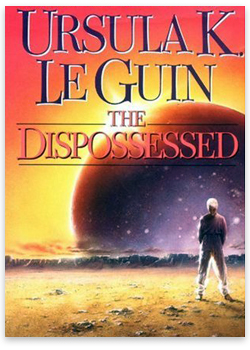


 The Plot
The Plot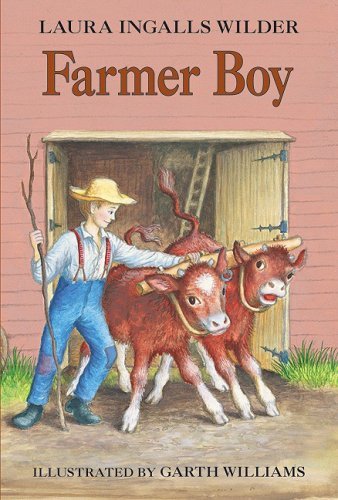
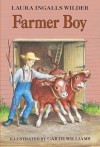 The Plot
The Plot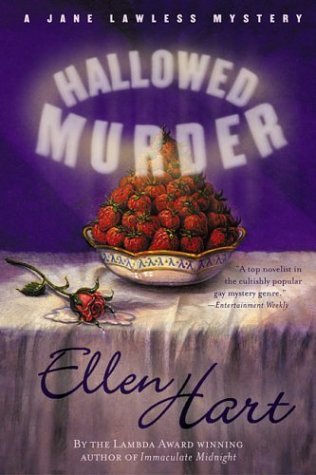
 The Plot
The Plot
 In the 22nd century, humans have spread out all over the Solar System, colonizing everywhere from Mercury to the moons of the gas giants. But in spite of their expansion, the fabled ‘space drive’ has still eluded scientists and many believe it’s not even possible to construct. All is thrown into question by the appearance of a strange object which enters the Solar System on a course to swing around the sun. The object is clearly artificial — the work of another race. The spaceship Endeavour is the only ship within range of its projected path and thus its crew is given the task of making contact with the object, now named “Rama”, and attempting to collect as much information as possible before its path goes too close to the sun for humans to follow. Though the collective governments of the various human settlements are excited by this unprecedented arrival, they are also quite nervous: is Rama a threat? The Endeavour crew will need to try and discover that as well.
In the 22nd century, humans have spread out all over the Solar System, colonizing everywhere from Mercury to the moons of the gas giants. But in spite of their expansion, the fabled ‘space drive’ has still eluded scientists and many believe it’s not even possible to construct. All is thrown into question by the appearance of a strange object which enters the Solar System on a course to swing around the sun. The object is clearly artificial — the work of another race. The spaceship Endeavour is the only ship within range of its projected path and thus its crew is given the task of making contact with the object, now named “Rama”, and attempting to collect as much information as possible before its path goes too close to the sun for humans to follow. Though the collective governments of the various human settlements are excited by this unprecedented arrival, they are also quite nervous: is Rama a threat? The Endeavour crew will need to try and discover that as well.